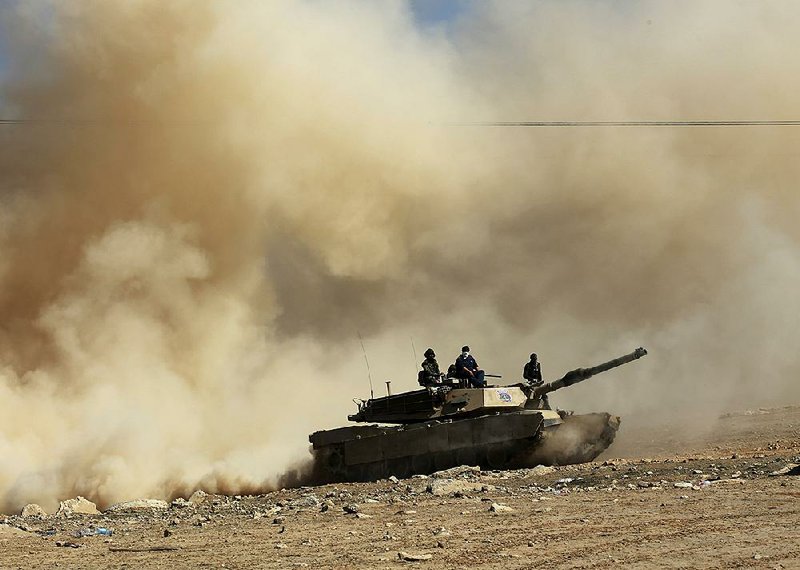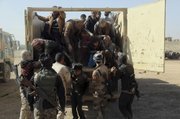BAGHDAD -- Iraqi militarized police captured a neighborhood on the western side of Mosul on Sunday amid fierce clashes with Islamic State militants, as thousands of people continued to flee the battle to government-controlled areas, security officials said.
Iraqi forces, backed by aerial support from the U.S.-led international coalition, launched a new push last week to drive Islamic State militants from Mosul's west, and have so far captured the city's international airport and an adjacent military base. Iraqi authorities declared Mosul's eastern half "fully liberated" from the Sunni militants in January, three months after launching the operation to take back Iraq's second-largest city.
At dawn Sunday, the Federal Police Commandos Division moved into the Tayaran neighborhood amid fierce clashes, Maj. Gen. Haider al-Maturi said, adding that the neighborhood "is now under their full control."
Al-Maturi said Islamic State militants deployed at least 10 suicide car bombs, but nine of them were blown up before reaching their targets. The 10th killed two policemen and wounded five. Al-Maturi also said his forces arrested two militants -- an Iraqi and a foreigner who speaks Russian.
Elsewhere, up to 3,000 people fled from the Mamun neighborhood Sunday morning, according to Iraqi special forces Brig. Gen. Salam Hashed, who oversees a screening center south of Mosul. Hashed said just over 2,500 people fled the previous day.
As Iraqi forces push deeper into western Mosul, the assault is bringing a surge of casualties -- at least 30 Iraqi security forces and more than 200 civilians killed or wounded in the past three days. Iraq's military does not release official casualty reports, but medics at front-line clinics provided figures on condition of anonymity.
A number of journalists have also been injured in the Mosul operation. Rudaw news organization said Shifa Gerdi, a presenter and head of output for Rudaw, was killed in a bomb attack Saturday. She was presenting a program on the Mosul offensive. A statement of condolences on the news agency's website described her as one of the organization's "most daring journalists."
The sudden spike in casualty numbers mirrors what played out in Mosul's east as the fight moved from rural villages to dense urban areas. Front-line medic stations that stood empty for the first days of the assault on Mosul's west are now overflowing. At one clinic Sunday, the dead had to be moved to the ground to free up beds as more injured arrived.
According to the U.N. figures, about 750,000 civilians are believed to be trapped in their houses in western Mosul, one of several challenges expected to slow the advance of the Iraqi troops. Another complication is western Mosul's old and narrow streets, which will force Iraqi soldiers to leave the relative safety of their armored vehicles.
Western Mosul is the last significant urban area the Islamic State holds in Iraq. The city is split roughly in half by the Tigris River.
Mosul fell to the Islamic State in the summer of 2014, along with parts of northern and western Iraq.
On Sunday afternoon, Iraq's special forces were still struggling to clear Mosul's Mamun neighborhood, bringing them back to a phase of grueling urban combat similar to the fight for eastern Mosul in early November when military attrition rates spiked.
Iraqi forces at a base a few miles south of the front called in airstrikes to take out small units of two or three Islamic State fighters who repeatedly managed to halt advancing Iraqi convoys.
The number of car bombs targeting Iraqi forces in western Mosul has been fewer than what forces experienced in the east: approximately four a day in the west compared with more than dozen a day in the east.
But the number of armed Islamic State drones has ballooned. In a single day, drones dropped more than 70 munitions on Iraqi forces. The bombs mostly caused light injuries, but they disrupted operations and monopolized the finite surveillance capabilities available from Iraq's military and the U.S.-led coalition backing the Mosul fight.
Mortar fire on the edge of Mamun neighborhood repeatedly sent families scattering for cover as they tried to flee Mosul's city limits. The route civilians are using to flee Mosul's west on foot is still within mortar range of Islamic State fighters inside the city and largely out in the open, leaving people more vulnerable than those who fled the city's eastern side.
"You can see this road is continually being hit by mortars from [the Islamic State group]," said Lt. Gen. Abdel Ghani al-Asadi a few miles from the front lines, pointing to the clouds of dust kicked up by the munitions on Mosul's edge.
At the clinic south of Mosul, casualties arrived in waves: Humvees and pickups swerved in front of the row of simple cots manned by a team of about a dozen doctors and medics.
Rahma Ghanim anxiously looked up as doctors checked her for serious wounds. The 19-year-old had been separated from the rest of her family when Iraqi security forces evacuated them from the edge of Mosul.
Her uncle had stepped on a roadside bomb. The blast killed him instantly, struck her in the back with mild shrapnel wounds and took a finger off her oldest brother's hand.
A Humvee arrived with the rest of her family and she screamed with joy, pulling away from the doctors treating her when she saw her father and aunt on the hood. The three embraced in tears.
Soldiers began opening the doors and six children climbed out, but one seat held a small body wrapped in a colorful blanket.
Her father, Ghanim Hussein, staggered to a sofa in shock, his face caked with dust and blood. "His name was Shukran," he said, "he was my youngest, 4 years old."
Soldiers moved the small body to the side of the road and sped off back to the front as quickly as they arrived.
"Inside Mamun, the streets are full of bodies," Rawa Salem, Rahma's cousin, said. "I saw 20 dead with my own eyes, many of them children."
Information for this article was contributed by Qassim Abdul-Zahra of The Associated Press.
A Section on 02/27/2017


